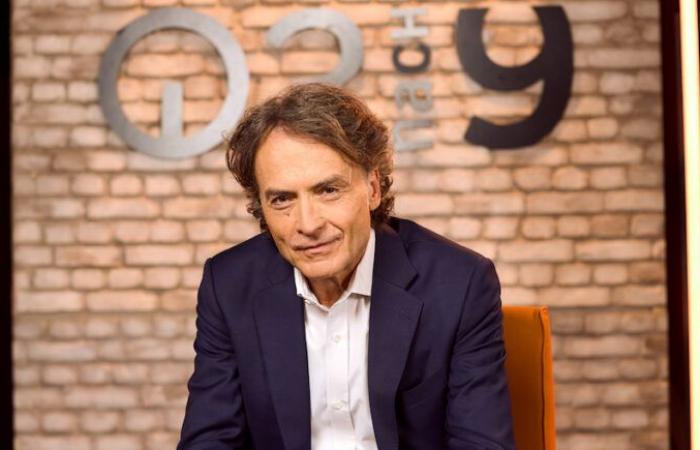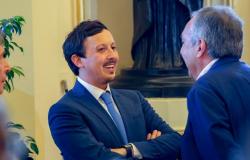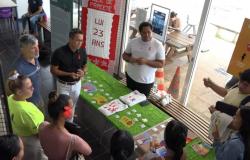Mr. di Lorenzo, when “3nach9” started 50 years ago – even when you came on board 35 years ago – there was far less media competition, let alone talk shows. What sets the show apart from all the others today?
That should actually be answered by professionals like you. On the one hand, “3nach9”, like all talk formats, was and is shaped by the moderators. The length of the conversations and the selection of guests also play an important role. I think we always manage to find a mix that sets us apart from others.
Do you have any influence on that? Or is Giovanni Di Lorenzo, who is in charge of “Zeit”, settling into his own nest here, so to speak?
When it comes to preparing the show, Judith and I actually have nothing to say, especially when it comes to guest selection and invitation policy. That’s a good thing, otherwise I would be in a permanent conflict of interest. We are not employed by Radio Bremen – we are freelancers. In my case, this situation has been going on for 35 years now. To this day I consider it a happy liaison.
What does the moderation of “3nach9” mean to you in contrast to the editor-in-chief of “Zeit“?
It is a monthly excursion from my everyday editorial life at “Zeit”. Jobst Plog – long-time NDR director – once put it this way: “3nach9 is Giovanni’s playground”. But that was in no way meant to be disrespectful or belittling. The hard work of a large team is behind the show. I also enjoy this trip a lot because the media reception is so completely different to “Zeit”: you present a television show, go to the supermarket the next morning and are asked about it. I still find this immediacy a great enrichment.
What can the TV medium do better than the printed newspaper – and vice versa?
(thinks) There are at least two big differences. On the one hand with the interview technique – and on the other hand with the effect that can be achieved. During a newspaper interview, if I’m lucky as a journalist, there’s a person sitting there who takes an hour and a half, two, sometimes even three hours. I can wait a long time to get a special sentence on a certain topic. Afterwards I can shorten the text, add more speed and get to the point more quickly. With “3nach9,” when it comes up, I have 20 minutes with a guest. Either you get something out of him in that time – or you ruin the conversation.
When is a conversation ruined for you?
If you don’t elicit anything insightful from the guest.
And what is the second big difference?
From my observation, television can provide a much better answer to an elementary everyday question. Namely: What is that person actually like? People are often more interested in that than what someone has to say in terms of content. The talk show is primarily a medium of impression.
I would add the authorization: On television, it’s said, said. Nothing is in danger of being lost afterwards.
Absolutely correct! We don’t cut anything out of the show. In this respect, our conversations at “3nach9” are pretty authentic encounters. However, of course we often deal with absolute media professionals who want to sell something. Then there is our ambition that they say something that they perhaps had not planned to reveal to the public in advance.
Unlike 35 or even 50 years ago, today we all carry a camera in our pockets. Camera experience is common. Are guests producing more today than before?
From what I’ve observed, that’s not the main difference from before…
I’m all ears…
The main difference is that people used to not be afraid of a shitstorm. That one sentence can practically cost you a lot of money. What has also completely disappeared: the type of guest who smokes like a chimney on the show or even talks about wine. All of this is being observed today – and our guests have all become very, very careful. In the past, we often experienced the complete opposite, especially with people from the Munich film industry. Back then, we were still broadcasting live late in the evening – some of the guests arrived really exhausted, disappeared into the toilet shortly before the broadcast started and were sitting in the studio minutes later, slightly sweating but brimming with strength. I haven’t observed this striking personality change for a long time.
“If you miss the first question, five precious minutes are gone – and in the worst case, part of the audience too.”
Nothing is being shipped today. So apart from such sudden personality changes: Is it a shame about the guests’ lack of concern?
Beautiful, truthful moments are still possible.
What trumps you: the carefully prepared questions or the ongoing conversation, which perhaps drifts in a completely different direction than expected?
I would always advocate the spontaneous reaction. As a moderator, you get involved in what the guest is saying – and in the mood in the room. This is also how I think about “time” in my conversations. I go into all interviews very well prepared, but I never have a list of questions. I also decide spontaneously which initial question to ask. When it comes to television, however, the pressure is greater: If you miss the first question, five precious minutes are lost – and in the worst case, a portion of the audience too.
And if the guest completely goes off topic in his answer, it becomes even more difficult…
Spontaneity is required.
As editor-in-chief of “Zeit”, you are expected to ask critical questions. How much do you have to hold back from cornering anyone on a talk show so as not to spoil the positive, social atmosphere?
What we do at “3nach9” cannot be compared with the interviews by Caren Miosga or Maybrit Illner. We are an entertainment format, not an information program. And of course I would conduct conversations differently for “Zeit”. We can get political at “3nach9”, but then again it’s about what someone prefers to cook at home. For example, I asked the Chancellor that when he was there recently. Because for me it is part of the image of a person who has power. We consciously don’t limit ourselves to certain topics, but rather jump back and forth, asking about everything that seems interesting to us. I think that’s part of “3nach9’s” formula for success.
And when in doubt, don’t probe too deeply?
It’s never a bad idea to follow up – but it’s often better to just let the conversation go. It’s Friday evening, people have already had enough bad news in the week. We want to stimulate and confront our viewers with people and topics that they may not have known before. But we remain an entertaining format.
There it is again, the “excursion” from being editor-in-chief at “Zeit”…
Yes, because at “3nach9” we don’t have to engage in political agenda setting. What we can do – and do again and again – is to discover personalities. Some guests are on a talk show with us for the very first time and experience a big boost from their appearance.
They said they don’t have any questionnaires. And yet every journalist knows it: that frustration when in the end you didn’t get around to asking that one question that you had been thinking about…
Oh, I can’t get rid of that even after 35 years of “3nach9”. The night after the show is usually a bad one because all the questions that you didn’t ask come up. The missed opportunities where the conversation could have been turned in a different direction. That’s already spinning in your head.
Why do all of the third party talk formats run almost at the same time on Friday evening? Is that in the interests of the audience?
I’m not an artistic director at ARD, so I can’t answer that for you. But even though the market is so fragmented, all formats are successful. In the history of “3nach9” we have rarely had ratings as good as in the last two years.
When you then get the guest list for the next show. Which constellations do you find particularly exciting?
Of course, it’s easier for me to talk to Friedrich Merz or Olaf Scholz – both of whom were our guests this year – than with an influencer or a dressage rider. Judith (Rakers, editor’s note) masters the conversation with such guests. Everyone has their strengths and weaknesses. But sometimes there are guests to whom Judith and I both say: I’d rather not.
So you don’t have to talk to everyone?
No, you don’t have to. One of the few cases in the history of “3nach9” in which I successfully vetoed the editorial decision was Jörg Haider many years ago. Of course he should be invited under the premise that we could unmask him with our critical questions. I objected and said that under no circumstances would we be able to do that on an entertainment show. I could have jumped on his neck, the only thing that would have happened is that the audience would have asked afterwards, why was this guest treated so badly?
How would you feel about the AfD politicians?
Basically, I am of the opinion that right-wing populist politicians cannot be ignored by television. If we do that – because we are afraid of giving them a big stage on which they can say anything without us having the means to object – then we are only contributing to their mythification. We promote a feeling of invincibility – and I think that’s wrong.
Does this also apply to “3nach9“?
As I said, an entertainment program is the wrong place to debate populists. But the attempt, which has been widespread for years to prevent them from taking place in political broadcasts, has clearly not resulted in the AfD losing any percentage. By the way, I didn’t think the much-criticized Thuringian TV duel was a failure at all. On the contrary, I got the impression that even a Höcke could very well be defeated.
Last question: If you are looking for a “3nach9“-round could bring together a group of people who are no longer with us, which personalities would be on this show?
Nice question, let me think about it. I would very, very much like to bring Peter Ustinov back, who gave us one of the most beautiful moments in the history of “3nach9”. And I would like to have Willy Brandt with Brigitte Seebacher-Brandt with us again. Because I miss Brandt in every way. I would also like to have Helmut Dietl there. And I would really like to talk to Caterina Valente again. If I can dream.
Mr. Di Lorenzo, thank you very much for the interview.






